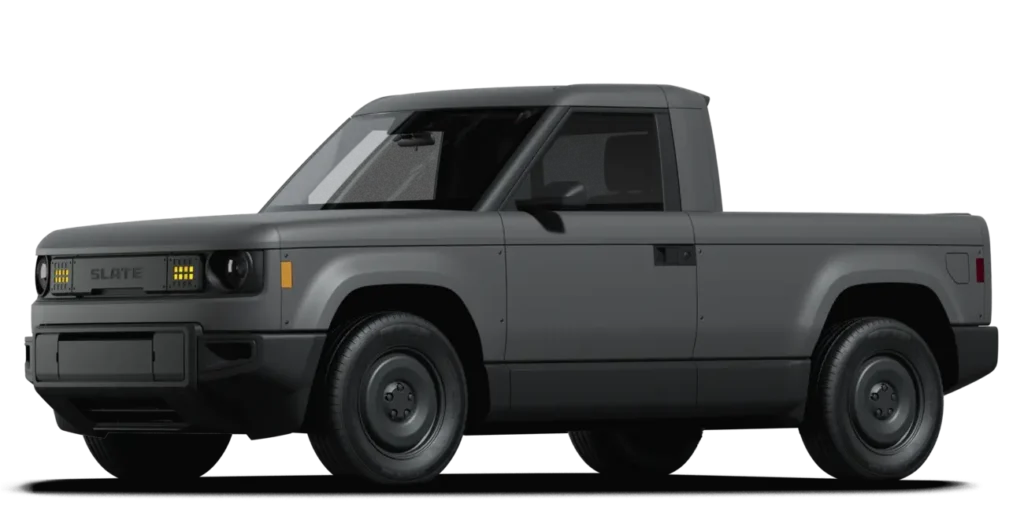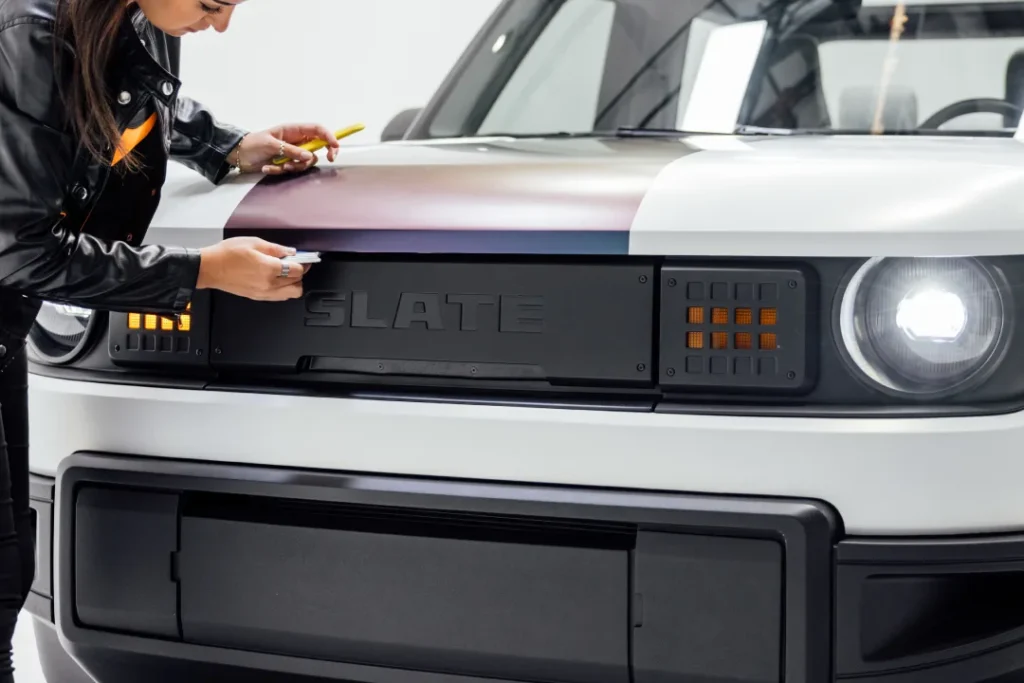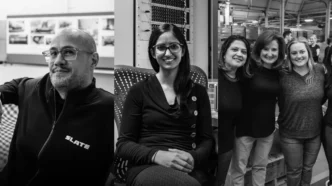Slate Auto, a new U.S.-based electric vehicle startup with financial backing from Jeff Bezos, is shaking up the EV scene with a radically different take: a minimalist, affordable pickup that turns away from Silicon Valley-style tech overload.
Unveiled Thursday night at a launch event in Long Beach, California, the Slate EV is being touted as the “anti-Tesla.” It’s unpainted, comes with manual windows, skips the center infotainment screen, and offers a deeply customizable design — all for under $20,000 after the federal EV tax credit.
What sets Slate apart isn’t just its price. It’s the brand’s decision to take a refreshingly analog approach to an industry obsessed with smart screens and autonomous driving. CEO Chris Barman said the company is finally delivering on the decades-old promise of a budget-friendly EV that doesn’t skimp on personality.

Designed for Simplicity and Personalization
The entry-level Slate EV pickup features a 52.7kWh battery that powers a single 150kW motor on the rear axle. This configuration delivers around 150 miles of range. For drivers who need more distance, a larger battery option will offer about 240 miles per charge. The truck charges via a North American Charging Standard (NACS) port — the same standard Tesla pioneered and now adopted by most major automakers.
Though compact — smaller than a Ford Maverick — the Slate truck is built for practicality. It sports 17-inch wheels, a five-foot bed, and a front trunk (or “frunk”) that doubles as an ice chest thanks to a built-in drain. Towing capacity sits at 1,000 pounds, and payload tops out at 1,400 pounds — modest numbers, but in line with its urban utility focus.

Buyers can reserve the truck for just $50 on the Slate Auto website, though the exact final price may still shift before its late 2026 delivery target.
Customization Is the Business Model
Slate is betting big on customization to stand out — and drive revenue. At launch, buyers can choose from over 100 accessories to tailor the EV to their lifestyle, from practical add-ons to aesthetic mods. Whether it’s installing a screen, roof rack, or even converting the pickup into a five-seater SUV, the brand promises an “easy DIY” experience.
The truck doesn’t even come painted. Instead, Slate encourages owners to wrap it themselves — or buy a wrap kit from the company. It’s part of a strategy to reduce manufacturing costs while giving customers more control over how their vehicle looks. Buyers can even name their truck and get a custom tailgate wrap with the title embossed.
To support this hands-on model, Slate is launching “Slate University” — a digital hub filled with how-to videos for installing upgrades. For those less inclined to tinker, authorized partners can handle installations for an added fee.
A Blank Canvas With Safety Built In
Despite its back-to-basics approach, the Slate EV still includes all federally required safety features, like airbags, a backup camera, and automatic emergency braking. What’s missing are the high-tech bells and whistles that often push EV prices into luxury territory.
Instead, Slate invites customers to build their vehicle as their needs grow — or as their budget allows. The company says buyers can add features gradually over time without needing a mechanic.
This approach isn’t just novel — it may be crucial to staying viable in a competitive market.
Going Against the EV Grain, With Big-Name Backers
While most EV startups aim high with expensive, tech-laden models, Slate is starting small. Its no-frills strategy is meant to sidestep the pitfalls that have plagued rivals like Canoo, Lordstown, and Fisker, all of which have filed for bankruptcy in recent years.
Even companies that are still standing — like Rivian and Lucid — are burning cash to make their vision of affordable EVs a reality.
Slate hopes to avoid that trap by focusing on affordability and optional upgrades. With more than $111 million raised (exact figures undisclosed), the company is backed not just by Bezos but also by billionaire Mark Walter, CEO of Guggenheim Partners and owner of the LA Dodgers.
So far, Slate has hired close to 400 people and is actively expanding. By sticking to domestic manufacturing in Indiana, the startup may also insulate itself from global supply chain turbulence affecting other automakers.
Barman summed it up simply: “We’re building vehicles people can actually afford and be proud to drive.”













